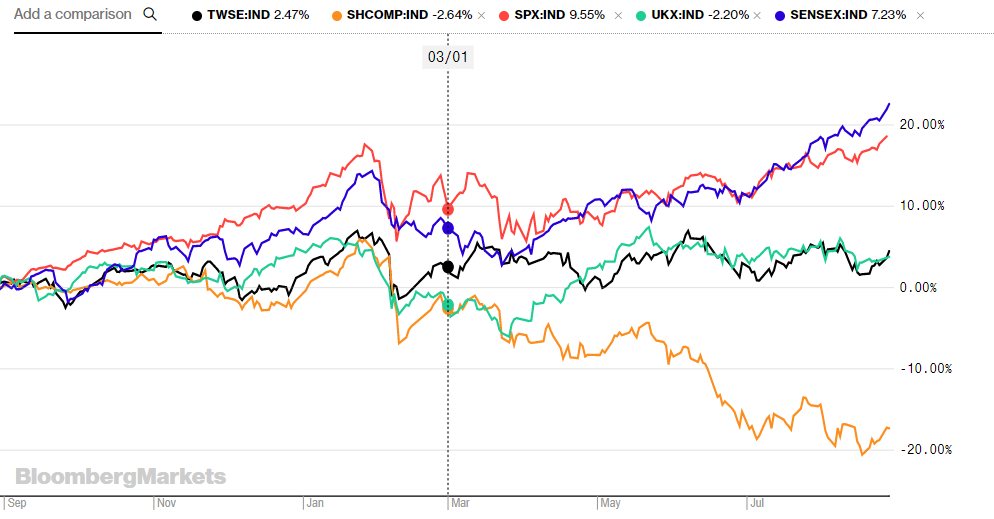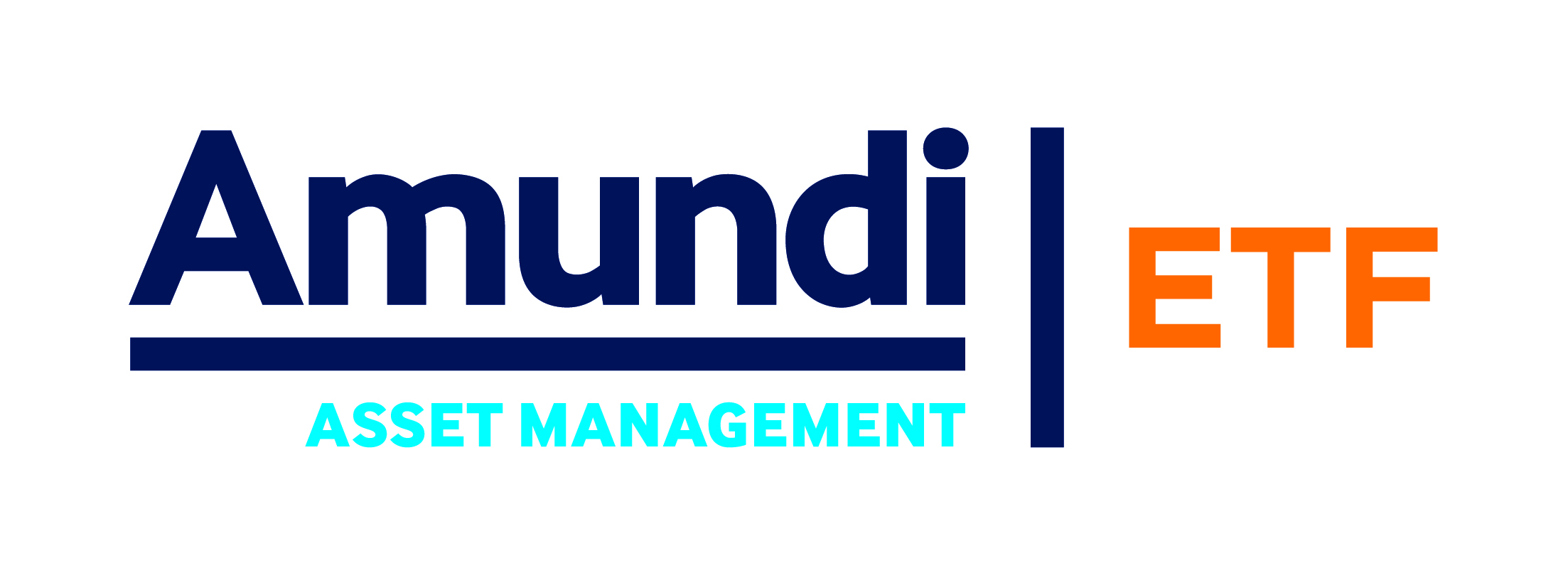Emerging market equities have had a pretty dire year and recent events in Turkey as well as Trump's trade wars with China have done little to help their performance. The MSCI Emerging Markets index was down 4.6% in the first seven months of the year.
However, EM equities are now at their cheapest level against US shares in the last five years and there are arguably enough plus points to make them look attractive. Now may be a good time to get in.
To give an idea of how badly they've done compared to US equities, the below graph shows the iShares MSCI EM ETF (IEEM) against the S&P 500 ETF from iShares. IEEM is in black and IUSA(iShares S&P 500 ETF)in orange. The graph shows their performance over the last five years;there is currentlyjust a 79 percentage point difference between the two at the time of writing.
A large part of EM's poor performance this year has largely been driven by China, which makes up a substantial portion of the MSCI EM index.
The index's main constituents by individual country are China, India and Taiwan. The below graphic is from MSCI's index report on July 31st and shows what portions of the index are where.
The below graph shows the way the indices based on the countries' stock exchanges have behaved over the last year. The graph compares the Shanghai Stock Exchange Composite Index, the S&P BSE Sensex index and the Taiwan Stock Exchange Weighted Index against the FTSE 100 and S&P 500.
While it's true that the Chinese portion has done badly this year - the index, which tracks the daily price performance of all A-shares and B-shares listed on the Shanghai Stock Exchange, is down 16% YTD - other countries have done well.

India's Sensex Index has returned 13.7% this year, it's less than the returns from the Shanghai Stock Exchange, but it also makes up a smaller portion in the index so can't outweigh the negative returns from China.
Alan Miller at SCM Direct explains that his firm has actually increased its exposure to emerging markets generally and South Korea specifically.
"The Turkey-related issues have had a greater impact on sentiment than fundamentals. For example, Samsung, the South Korean based blue-chip trades on 6.6x current year earnings compared to 18.9x for Apple. The average discount of an emerging markets stock to a developed market stock is currently 31% but accompanied by a higher forecast earnings growth rate over the next 2 years."
And, according to a report from Lazard Asset Management, the interest rate differentials between developed and emerging markets have widened over the past two years in favour of emerging markets.
"Their external financing burdens have also eased as they have put their fiscal houses in order and their real interest rates—the compensation for investing in their markets—have risen. This should provide a strong base from which emerging markets can defend against a stronger dollar."
This currency issue is important for the outlook for emerging markets. One of the reasons emerging markets have done so badly this year is due, in part, to a strengthening dollar.
Lazard points out that they attribute the dollar's sharp rise to fundamental and technical drivers, which they believe will be short lived. The two main drivers are pro-cyclical tax reform (following an already strong US economy) and US policy tightening in contrast to the accommodative stance of most other developed markets' central banks. We have previously written about whether US equities are likely to sustain their run.
Lazard adds that the tremendous ability of emerging markets companies to evolve and innovate is clear when looking at how far they have come in the past 20 years. In 1995, technology was 2% of the emerging markets index. As of mid-2018, it was the largest sector at a nearly 30% weight. Materials, once the second-largest sector at 20% of the index isless than 8%.
There are a number of ETFs listed on the London Stock Exchange offering exposure to emerging markets through various indexes.
One of the largest and oldest is iShares MSCI EM UCITS ETF (IEEM). It was launched at the end of 2005 and has over $5bn in the fund. However, it's still fairly costly compared to some of the newer ETFs that have been launched in the preceding years.
The cheapest of the emerging market ETFs on offer is Amundi's AUEG, which costs 0.2% and tracks the MSCI Emerging Markets index. It's a fraction less than Vanguard's VDEM which costs 0.25% and tracks the FTSE Emerging markets index;the sterling version (VFEM) has had the best performance YTD of all the ETFs on the London Stock Exchange at -1.58%.
Index
Index
Index
Index
Index
Index
Index
Index
0.2% (Exp Ratio)
Index
0.49% (Exp Ratio)
Index
So recent performance hasn't been great, but that doesn't mean the future can't be promising. ETFTERYTD RTNINDEX VANGUARD FTSE EMERGING MARKETS UCITS ETF (VDEM)0.25%-5.43%FTSE Emerging MarketsVANGUARD FTSE EMERGING MARKETS UCITS ETF (VFEM)0.25%-2.66%FTSE Emerging MarketsiShares MSCI EM ETF USD Dist (IEEM)0.75%-3.65%MSCI Emerging MarketsiShares MSCI EM ETF USD Acc (SEMA)0.68%-3.46%MSCI Emerging MarketsiShares MSCI EM ETF USD Dist (IDEM)0.75%-7.32%MSCI Emerging MarketsiShares MSCI EM ETF USD Acc (IEMA)0.68%-7.15%MSCI Emerging MarketsAmundi MSCI Emerging Markets ETF (AUEG)0.2%-1.92%MSCI Emerging MarketsAmundi MSCI Emerging Markets ETF (AUEG)0.2%-7.32%MSCI Emerging MarketsXtrackers MSCI EM ETF (XMMS)0.1% (m'mnt fee)-1.88% (over three months only)MSCI Emerging MarketsXtrackers MSCI Emerging Markets Swap ETF (XMMD)0.29% (m'mnt fee)-6.63%MSCI Emerging Markets
Index
Index
(EMSM)
Small Cap Index
(EMRD)
Small Cap Index
Index.
Index.
HSBC MSCI Emerging Markets ETF (HMEM)0.4%-6.29%MSCI Emerging MarketsHSBC MSCI Emerging Markets ETF (HMEF)0.4%-3.35%MSCI Emerging MarketsSPDR MSCI Emerging Markets Small Cap UCITS ETF0.55%-5.54%MSCI Emerging MarketsSPDR MSCI Emerging Markets UCITS ETF0.42%-6.58%MSCI Emerging MarketsFranklin LibertyQ Emerging Markets UCITS ETF (FREM)0.55%-6.82%LibertyQ Emerging MarketsFranklin LibertyQ Emerging Markets UCITS ETF (FLXE)0.55%-3.17%LibertyQ Emerging MarketsSource: Bloomberg & LSE





